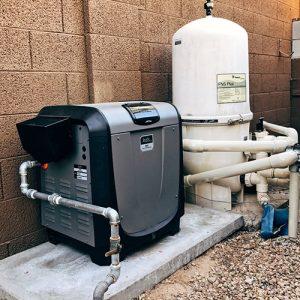 During the winter season, some ice on your pool heat pump is a common occurrence. However, when the whole unit is covered in ice, there is a concern for worry as your device won’t function well and might be at risk of getting damaged. The most common reason your pool heat pump freezes up is the lack of proper care and maintenance. This causes damage to the device, which eventually leads to the device freezing up. Here are some more reasons that might be why your pool heat pump is freezing up.
During the winter season, some ice on your pool heat pump is a common occurrence. However, when the whole unit is covered in ice, there is a concern for worry as your device won’t function well and might be at risk of getting damaged. The most common reason your pool heat pump freezes up is the lack of proper care and maintenance. This causes damage to the device, which eventually leads to the device freezing up. Here are some more reasons that might be why your pool heat pump is freezing up.
Damaged unit or system
Most heaters come with a defrost unit, and the primary purpose of the defrost unit is to defrost any ice that might settle in the device. In case of a faulty defrost unit, the device won’t warm ice crystals that freeze up in the machine. Also, a lower temperature in the evaporator fins compared to the dew temperature in ambient air causes water from condensation to be produced on the evaporating fin’s surface. When the temperature is 0 degrees Celsius, the ambient air will cause the condensation water to turn into frost. Here are a few more parts that, when damaged can lead to the freezing up of the machine.
Insufficient airflow
Once the pool heat pump’s refrigerant temperature drops below the freezing point, any moisture in the atmosphere can freeze, especially in the condenser coil and the evaporator. This happens if there is no sufficient airflow going through the device. Insufficient airflow causes moisture to linger in the unit system, which turns into frost during cold seasons.
Coldwater
Freezing rain settles on the device and turns into frost, and once the top part starts freezing, the rest will follow quickly. Another reason your pool heat pump is freezing up might be raining hailstones that clog in the device, freezing it from the inside out.
Leaking heat pump/condensation
Before jumping to conclusions, check to see the cause since both issues present almost similar challenges. If the heat pump is leaking, there is a busted tube releasing water on the inside, and in cold seasons, the water released can turn into frost and freeze up the device. You need to switch off your heat pump and run water through to push out the condensation. It would help if you also considered fixing the air circulation of your device. There are tests a person can run to figure out which of the two issues is the problem. Use a chlorine strip near the heater to test if there is a reaction, and if a reaction occurs, it’s an indication of a leaking heat pump. When there is no reaction, it simply means it’s condensation or rainwater.
Use a freeze protector
Just like its name implies, a freeze protector safeguards your pipes and pool from freezing. A freeze protector connects with your pool devices to automate the circulation of water, and power on your pool heat pump when the temperatures reach freezing points. It’s like a robotic pool assistant safeguarding your pool equipment and the pool itself.
Ensure good airflow
As discussed above, insufficient airflow leads to frost on the inside of the device. Remember to regularly clean your device and clear any leaves, particles, or debris that might block a perfect airflow.
Settling
Commonly heat pumps are placed on a concrete slab, and with time the concrete settles in the slab. This might block the drainage passage for melted ice and prevent good airflow, leading to ice building up. If this is your problem, the fix is just slightly moving it a bit higher to free up space for the ice to pass when it’s melted.
